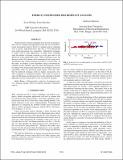Energy-constrained discriminant analysis
Author(s)
Philips, Scott M.; Berisha, Visar; Spanias, Andreas
DownloadPhilips-2009-Energy-constrained discriminant analysis.pdf (138.3Kb)
PUBLISHER_POLICY
Publisher Policy
Article is made available in accordance with the publisher's policy and may be subject to US copyright law. Please refer to the publisher's site for terms of use.
Terms of use
Metadata
Show full item recordAbstract
Dimensionality reduction algorithms have become an indispensable tool for working with high-dimensional data in classification. Linear discriminant analysis (LDA) is a popular analysis technique used to project high-dimensional data into a lower-dimensional space while maximizing class separability. Although this technique is widely used in many applications, it suffers from overfitting when the number of training examples is on the same order as the dimension of the original data space. When overfitting occurs, the direction of the LDA solution can be dominated by low-energy noise and therefore the solution becomes non-robust to unseen data. In this paper, we propose a novel algorithm, energy-constrained discriminant analysis (ECDA), that overcomes the limitations of LDA by finding lower dimensional projections that maximize inter-class separability, while also preserving signal energy. Our results show that the proposed technique results in higher classification rates when compared to comparable methods. The results are given in terms of SAR image classification, however the algorithm is broadly applicable and can be generalized to any classification problem.
Date issued
2009-05Department
Lincoln LaboratoryJournal
IEEE International Conference on Acoustics, Speech and Signal Processing, 2009. ICASSP 2009
Publisher
Institute of Electrical and Electronics Engineers
Citation
Philips, S., V. Berisha, and A. Spanias. “Energy-constrained discriminant analysis.” Acoustics, Speech and Signal Processing, 2009. ICASSP 2009. IEEE International Conference on. 2009. 3281-3284. © 2009 IEEE.
Version: Final published version
Other identifiers
INSPEC Accession Number: 10701068
ISBN
978-1-4244-2353-8
ISSN
1520-6149